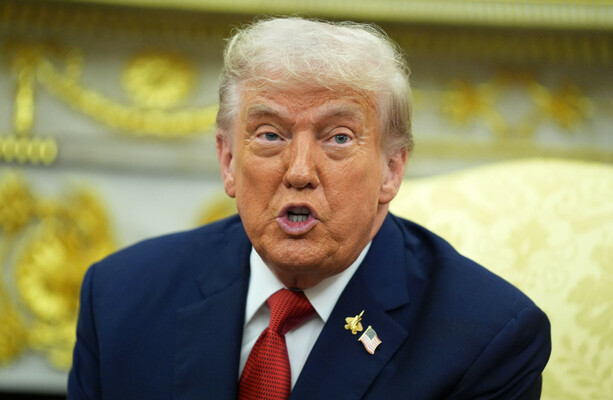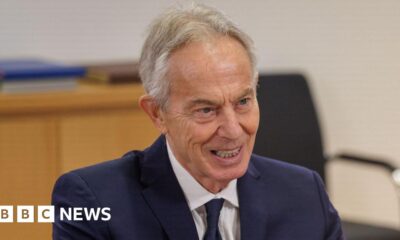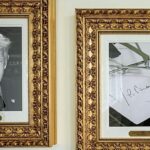LAST UPDATE
|
41 mins ago
US PRESIDENT DONALD Trump’s newly announced 100% import tariff on branded pharmaceutical drugs will not apply to products from the European Union, according to Brussels.
Trump announced the move last night along with a raft of other taxes, including 50% on kitchen cabinets and bathroom vanities, 30% on upholstered furniture and 25% on heavy trucks. The additional tariffs are due to kick in on 1 October.
Writing on his Truth Social platform, Trump said the tariffs on “any branded or patented” pharmaceutical products would not apply to companies that are building manufacturing plants in the US, which he defined as either “breaking ground” or being “under construction”.
It was unclear how the tariffs would apply to companies that already have factories in the US.
In August, it was announced that pharma and car exports from the EU to the US would be subjected to a 15% tariff rate in a trade deal struck between both parties. It followed months of uncertainty, which included threats from Trump that the tax could rise as high as 250% at one point.
This morning, the European Commission’s deputy chief spokesperson Olof Gill insisted that the new tariffs will not impact the EU due to the deal struck in August.
“We have a clear, all-inclusive, 15% tariff ceiling arising from our deal with the US. We’re the only trade partner to achieve this outcome with the US, and we look forward to that being implemented soon,” he told RTÉ’s Today with Claire Byrne.
Asked how he could be sure about that, Gill said: “Because it’s spelled out in black and white in the EU-US joint statement that we agreed last month.”
He said he did not need an assurance from the US that Trump was still committed to this deal and said the EU expects the US to honour it “in full”.
When pressed on the matter a number of times, Gill firmly reiterated that the deal struck between the EU and the US in August meant that the new tariffs would not apply to European drug exports.
He also said that European Trade Commissioner Maroš Šefčovič met with US trade representative Jamieson Greer yesterday where they discussed “this and a number of other topics”, including that the US last week implemented a commitment from the EU-US deal to bring in certain exemption categories for European car exports.
“That shows that the US is implementing its commitments, and they will now do the same with the pharma,” Gill said, though he stopped short of confirming whether Šefčovič was told that these new tariffs would not apply to EU-made drugs.
Ireland is one of the biggest exporters of pharmaceutical products to the US. Pharma exports to US were valued at €19.9 billion for the first two months of this year, almost half of the value of all Irish pharma exports to the US in 2024 (€44.4 billion).
“Starting October 1st, 2025, we will be imposing a 100% Tariff on any branded or patented Pharmaceutical Product, unless a Company IS BUILDING their Pharmaceutical Manufacturing Plant in America…” – President Donald J. Trump pic.twitter.com/z5EXQhw1xK
— The White House (@WhiteHouse) September 25, 2025
The announcement came just hours after Tánaiste Simon Harris met with US Secretary of Commerce Howard Lutnick in Washington DC, and it is unclear if the move was flagged with him.
In a statement after the meeting, Harris said the two men discussed the issue of non-tariff barriers as well as the ongoing Section 232 investigations on pharmaceuticals and semiconductors.
Government will study announcement
Speaking further this morning, Harris said the government will be studying the impact of this announcement, which he noted includes a “number of exemptions”, together with EU counterparts.
Harris stressed that the agreement struck last month between the EU and the US “made absolutely clear” that any new tariffs announced by the US on pharmaceuticals under its Section 232 investigation would be capped at 15%.
“This remains the case and underlines again the value of the agreement reached last month,” Harris said.
“Returning home after a series of valuable meetings in both New York and Washington, where I met with US Secretary of Commerce, Howard Lutnick, I remain as convinced as ever of the mutually beneficial nature of the dynamic, two way economic partnership between Ireland and the US as well as between the EU and the US.”
The Trump administration initiated new investigations into the imports of pharmaceuticals under Section 232 of the Trade Expansion Act in April. The purpose of the investigation is to determine the effect of imports on US national security and whether certain imports “threaten to impair” national security.
Harris also gave a speech to the US Chamber of Commerce yesterday, where he spoke about how tariffs were bad for countries, businesses and consumers.
There were representatives from the pharma industry in the room, who asked the Tánaiste how the sector could continue to advocate for lower tariffs on pharmaceuticals. Harris said the setting up of an EU pharma taskforce “makes a lot of sense”, stating that Ireland has significant pharma presence.
He said Ireland and pharma companies needed to work together to present the question to the US administration on just how would pharma operate if it didn’t have a hold in the EU, adding that it is vital for pharma companies to have reach into the EU markets.
The Fine Gael leader also told the US Chamber of Commerce that it needed reminding that about 80% of pharma products produced in Ireland goes back into the US, and that it is American workers that then have to buy it from their hard-earned paycheck.
He said there is now a need to “driving the message home of the mutual benefit of the relationship”.
US impact
In the US, the tariffs risk intensifying inflation that is already elevated, as well as slowing economic growth, as employers getting used to Trump’s previous import taxes grapple with new levels of uncertainty.
The prospect of prices doubling for some medicines could send shockwaves to US voters as health care expenses, as well as the costs of Medicare and Medicaid, potentially increase.
Trump said that foreign manufacturers of furniture and cabinets were flooding the US with their products and that tariffs must be applied “for National Security and other reasons”.
He said that foreign-made heavy trucks and parts are hurting domestic producers.
“Large Truck Company Manufacturers, such as Peterbilt, Kenworth, Freightliner, Mack Trucks, and others, will be protected from the onslaught of outside interruptions,” the president posted.
Trump has long maintained that tariffs are the key to forcing companies to invest more in domestic factories. He has dismissed fears that importers would pass along much of the cost of the taxes to consumers and businesses in the form of higher prices.
He continues to claim that inflation is no longer a challenge for the US economy, despite evidence to the contrary. The consumer price index has increased 2.9% over the past 12 months, up from an annual pace of 2.3% in April, when Trump first launched his sweeping tariffs.
There is also no evidence that the tariffs are creating factory jobs or more construction of manufacturing facilities. Since April, the Bureau of Labor Statistics has reported that manufacturers cut 42,000 jobs and builders have downsized by 8,000.
“There’s no inflation,” Trump told reporters on Thursday. “We’re having unbelievable success.”
With reporting from Christina Finn, Eoghan Dalton and Press Association

















































